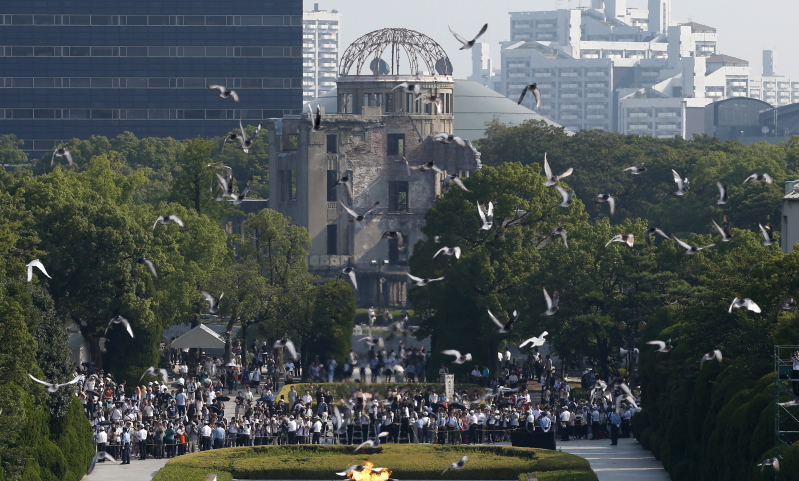
Barack Obama will become the first U.S. president to visit Hiroshima in Japan later this month, but he will not apologize for the United States' dropping of an atomic bomb on the city at the end of World War Two, the White House said on Tuesday.
Awarded the Nobel Peace Prize early in his presidency in 2009 in part for his commitment to nuclear nonproliferation, Obama on May 27 will tour the site of the world's first nuclear bombing with Japan's Prime Minister Shinzo Abe.
With the end of his last term in office approaching in January 2017, Obama will "highlight his continued commitment to pursuing the peace and security of a world without nuclear weapons," the White House said in a statement.
"He will not revisit the decision to use the atomic bomb at the end of World War II. Instead, he will offer a forward-looking vision focused on our shared future," Ben Rhodes, Obama's deputy national security adviser, wrote in a separate blog. He called it the "appropriate moment" for Obama to go there.
The visit comes as part of a May 21-28 swing through Asia, which will include a Group of Seven summit in Japan and his first trip to Vietnam. It will be the 10th trip to the region for Obama, who has made an economic and strategic "pivot" toward Asia a centerpiece of his foreign policy.
On the final day of the summit in Japan, Obama and Abe will visit the Hiroshima Peace Memorial Park near the spot where a U.S. warplane dropped an atomic bomb 71 years ago at the end of World War Two.
WHITE HOUSE DEBATE
The decision to go to Hiroshima was hotly debated within the White House. There were concerns that a U.S. presidential visit would be heavily criticized in the United States if it were seen as an apology.
The bomb dropped on Aug. 6, 1945 killed thousands of people instantly and about 140,000 by the end of that year. Another was dropped on the city of Nagasaki on Aug. 9, 1945, and Japan surrendered six days later.
The majority of Americans view the bombing of Hiroshima and Nagasaki as justified to end the war and save U.S lives. Most Japanese see it as unjustified.
Abe, speaking to reporters in Tokyo, said he hoped "to turn this into an opportunity for the U.S. and Japan to together pay tribute to the memories of the victims" of the nuclear bombing.
"President Obama visiting Hiroshima and expressing toward the world the reality of the impact of nuclear radiation will contribute greatly to establishing a world without nuclear arms," Abe added.
Obama's visit will be a symbolic capstone for the nuclear disarmament agenda he laid out in a landmark speech in Prague in 2009. His aides tout last year's Iran nuclear deal as a major piece of his foreign policy legacy.
But Obama has made only modest progress toward the goal of securing the world's loose nuclear materials, and there is no guarantee his White House successor will keep the issue a high priority.
Lisbeth Gronlund, co-director of the Union of Concerned Scientists' Global Security Program, said Obama must "do more than give another beautiful speech" and should instead announce concrete action on nuclear disarmament when he visits Hiroshima.
After U.S. Secretary of State John Kerry visited Hiroshima last month, survivors of the bombing and other residents said that if Obama visits, they hope for progress in ridding the world of nuclear weapons, rather than an apology.






